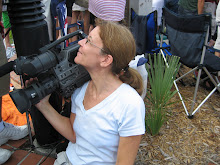I'm not sure what to think about Berlinger's fight to suppress raw footage collected for his film Crude. Apparently, the Netflix online streaming version of Crude contained footage of Equadoran lawyers strategizing that the DVD version does not. Chevron's attorneys want to see all of that footage because they think it will help their case.
The journalist in me wants to defend his first amendment right to protect his "notes," which in the case of a documentarian, means raw footage. At the same time, I believe documentaries should reveal "truth." So, if the online version of the film shows the Ecuadoran lawyers making mistakes... and that's a more truthful version of the story than the DVD which does not contain the lawyer footage... what does that say about the manipulation of footage to create instead a less accurate "version" of the truth?
My sympathy, of course, is with the indigenous people of Ecuador who have clearly been screwed by Chevron. Further, the court's decision to force Berlinger to release his raw footage takes us down the slippery slope that could ultimately harm the protected sources of any journalist.
I guess I wish Berlinger had been more careful. Find the premise of your documentary, select the material that supports your premise, then stick with it. What bothers me most is one version of the truth online, and another on DVD. I'm afraid this damages the credibilty of his argument. I wonder what Michael Rabiger would say.
Subscribe to:
Post Comments (Atom)

2 comments:
I've been blogging about Chevron in Ecuador for a while now. I think Chevron is just trying to slow down the lawsuit... one of many dirty tricks..
See my blog:
http://livesforoil.blogspot.com/
Thank you Ashlea, I would never trust Chevron to do the right thing by anyone. I'm glad Berlinger got a stay from the courts. I will check out your blog... thanks for posting your comment.
Post a Comment